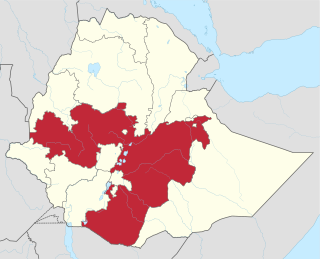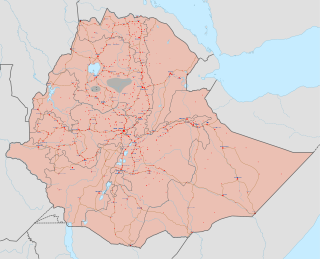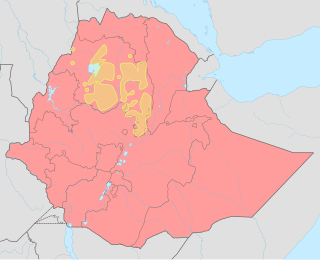
The Oromo Liberation Army is an armed opposition group active in the Oromia Region of Ethiopia. The OLA consist primarily of former armed members of the pre-peace deal Oromo Liberation Front (OLF) who refused to disarm out of skepticism of the peace deal, and former youth protestors who grew disillusioned with nonviolent resistance.

The 2021 Ethiopian general election to elect members of the House of Peoples' Representatives was held on 21 June 2021 and 30 September 2021. Regional elections were also held on those dates.

The Hachalu Hundessa riots were a series of civil unrest that occurred in the Oromia Region of Ethiopia, more specifically in the hot spot of Addis Ababa, Shashamene and Ambo following the killing of the Oromo musician Hachalu Hundessa on 29 June 2020. The riots lead to the deaths of at least 239 people according to initial police reports. Peaceful protests against Hachalu's killing have been held by Oromos abroad as well. The Ethiopian Human Rights Commission (EHRC) found in its 1 January 2021 full report that part of the killings were a crime against humanity, with deliberate, widespread systematic killing of civilians by organised groups. The EHRC counted 123 deaths, 76 of which it attributed to security forces.
On 2 November 2020, allegedly a group of up to 60 gunmen attacked a schoolyard in the village of Gawa Qanqa in the Guliso District of West Welega Zone in the Oromia Region of Ethiopia, killing 32-54 people. The state-run Ethiopian Human Rights Commission said the attack had targeted people of the Amhara ethnic group. 200 people were gathered by an armed group for a meeting and then were shot at by the armed group. Soldiers had reportedly left the area hours before the attack. The Oromia Regional Government blamed the Oromo Liberation Army for the attack, who denied responsibility. Prime Minister Abiy Ahmed denounced the attack and promised a thorough investigation. Ethnic violence has increased since he took office.
The Transitional Government of Tigray was a caretaker administration that was formally declared by the House of Federation of Ethiopia on 7 November 2020, in the context of a conflict between the Tigray People's Liberation Front (TPLF), in power in the Tigray Regional State and the federal government of Ethiopia. In late November 2020, the administration, headed by Mulu Nega, planned public consultation and participation in choosing new leaders at the regional and zonal level and preservation of woreda and kebele administrations. The Transitional Government left Tigray in late June 2021 during Operation Alula.

Following the 2018 dissolution of the ethnic federalist, dominant party political coalition, the Ethiopian People's Revolutionary Democratic Front, there was an increase in tensions within the country, with newly resurgent regional and ethnically based factions carrying out armed attacks on military and civilians in multiple conflicts throughout Ethiopia.

The OLA insurgency is an armed conflict between the Oromo Liberation Army (OLA), which split from the Oromo Liberation Front (OLF) in 2018, and the Ethiopian government, continuing in the context of the long-term Oromo conflict, typically dated to have started with the formation of the Oromo Liberation Front in 1973.
Events in the year 2022 in Ethiopia.

Since the 1990s, the Amhara people of Ethiopia have been subject to ethnic violence, including massacres by Tigrayan, Oromo and Gumuz ethnic groups among others, which some have characterized as a genocide. Large-scale killings and grave human rights violations followed the implementation of the ethnic-federalist system in the country. In most of the cases, the mass murders were silent with perpetrators from various ethno-militant groups—from TPLF/TDF, OLF–OLA, and Gumuz armed groups.
The 1995 Ethiopian Federal Constitution formalizes an ethnic federalism law aimed at undermining long-standing ethnic imperial rule, reducing ethnic tensions, promoting regional autonomy, and upholding unqualified rights to self-determination and secession in a state with more than 80 different ethnic groups. But the constitution is divisive, both among Ethiopian nationalists who believe it undermines centralized authority and fuels interethnic conflict, and among ethnic federalists who fear that the development of its vague components could lead to authoritarian centralization or even the maintenance of minority ethnic hegemony. Parliamentary elections since 1995 have taken place every five years since enactment. All but one of these have resulted in government by members of the Ethiopian People's Revolutionary Democratic Front (EPRDF) political coalition, under three prime ministers. The EPRDF was under the effective control of the Tigray People's Liberation Front (TPLF), which represents a small ethnic minority. In 2019 the EPRDF, under Abiy, was dissolved and he inaugurated the pan-ethnic Prosperity Party which won the 2021 Ethiopian Election, returning him as prime minister. But both political entities were different kinds of responses to the ongoing tension between constitutional ethnic federalism and the Ethiopian state's authority. Over the same period, and all administrations, a range of major conflicts with ethnic roots have occurred or continued, and the press and availability of information have been controlled. There has also been dramatic economic growth and liberalization, which has itself been attributed to, and used to justify, authoritarian state policy.
On 18 June 2022, the Oromo Liberation Army (OLA) was accused of massacring over 500 Amhara civilians in the Gimbi county of Oromia Region, Ethiopia. Witnesses said that the OLA intentionally targeted ethnic Amhara people. This attack is part of a series of Amhara massacres that occurred in 2022.
The Amhara Association of America (AAA) (Amharic: የዐማራ ማህበር በአሜሪካ) is a non-profit organization based in Charlotte, North Carolina, focused on advocating for the human rights of the Amhara people in Ethiopia.
Events in the year 2023 in Ethiopia.
Kajela Merdassa is an Ethiopian politician and senior member of the Oromo Liberation Front (OLF). He was appointed Minister of Culture and Sports of Ethiopia on 6 October 2021.

The War in Amhara is an armed conflict in the Amhara Region of Ethiopia that began in April 2023 between the Amhara regional forces along with the Fano militia, and the Ethiopian government. The conflict began after the Ethiopian military raided the Amhara Region to disarm the Amhara Special Forces and other regional allies, which resulted in resistance of local armed forces and a series of protests in Gondar, Kobo, Sekota, Weldiya and other cities on 9 April.

Anti-Amhara sentiment is opposition, hatred, discrimination and bias against Amhara people in Ethiopia. Amharas are subjected to longstanding ethnic hatred among the Tigrayan elites. Persecution of Amharas are typically stemmed from accusation of Amhara for atrocities and land acquisition during the colonial rule in the Ethiopian Empire; many Oromo activists and intellectualists pertained Amhara of being "Neftenya", a feaudal lord and vassal who manages the lands loyal to the imperial government.

Anti-Oromo sentiment or Oromophobia, is opposition, hatred, discrimination or prejudice against the Oromo ethnic group. Anti-Oromo sentiment has root its accusations during the rule of Ethiopian Empire, particularly in the reign of Emperor Menelik II in 1880s. Oromo nationalists argued that the Oromo have been subjugated and oppressed by dominant Amhara feudal rulers and its oppression persisted throughout 20th century. Under Haile Selassie, Oromos have been targeted to persecutions after long wave of resistance. Many Oromo revolutionaries like Mamo Mazamir, Haile Mariam Gamada and General Tadesse Birru faced execution by Selassie government and then the Derg regimes.
The 2022 North Shewaclashes were a series of clashes that broke out between ethnic Amhara Fano militiamen, the Oromo Liberation Army, and the Ethiopian National Defence Forces in the North Shewa zone in the Oromia region and the Oromia Zone in the Amhara region, which resulted in dozens of people killed and thousands displaced.
Koree Nageenyaa translated as Security Committee from Oromo language, is a secret Ethiopian government agency allegedly responsible for orchestrating executions within Ethiopia and more specifically in the regional state of Oromia. Koree Nageenyaa is believed to be composed of high-ranking individuals in Oromia, the biggest and most densely populated region in Ethiopia, has purportedly issued directives for unlawful detentions and extrajudicial killings with the aim of suppressing an uprising.







